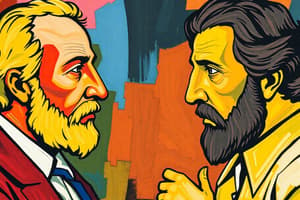Podcast
Questions and Answers
Ano ang pinakamahalagang katangian ng klasikal na liberalism?
Ano ang pinakamahalagang katangian ng klasikal na liberalism?
- Pagsuporta sa mga programa ng gobyerno
- Pagpapahalaga sa kolektibong karapatan
- Paglipat ng mga kakayahan sa estado
- Pagtataguyod sa kalayaan ng indibidwal (correct)
Bakit ginawa ang modern liberalism bilang tugon sa mga hamon ng Rebolusyong Industriyal?
Bakit ginawa ang modern liberalism bilang tugon sa mga hamon ng Rebolusyong Industriyal?
- Upang ipagtataguyod ang mga programa ng gobyerno sa kalusugan at edukasyon
- Upang mapabuti ang kalidad ng buhay ng mga mamamayan
- Upang tugunan ang mga pangangailangan ng mga tao sa mga serbisyo ng gobyerno (correct)
- Upang ipagtanggol ang mga karapatan ng mga manggagawa
Sino ang mga kilalang mga tampok ng klasikal na liberalism?
Sino ang mga kilalang mga tampok ng klasikal na liberalism?
- Jean-Jacques Rousseau, Immanuel Kant, at Georg Wilhelm Friedrich Hegel
- Karl Marx, Friedrich Engels, at Vladimir Lenin
- John Locke, Adam Smith, at John Stuart Mill (correct)
- John Rawls, Robert Nozick, at Ronald Dworkin
Ano ang kabilang sa mga katangian ng klasikal na liberalism?
Ano ang kabilang sa mga katangian ng klasikal na liberalism?
Ano ang pangunahing layunin ng modern liberalism?
Ano ang pangunahing layunin ng modern liberalism?
Ano ang pangunahing adhikain ng mga liberal sa kanilang pagtatanggol sa mga karapatan ng mga tao?
Ano ang pangunahing adhikain ng mga liberal sa kanilang pagtatanggol sa mga karapatan ng mga tao?
Sino ang mga pangunahing tauhan sa liberal na feminismo?
Sino ang mga pangunahing tauhan sa liberal na feminismo?
Ano ang pangunahing adhikain ng mga socialista?
Ano ang pangunahing adhikain ng mga socialista?
Ano ang pangunahing adhikain ng mga demokrasya sosyalismo?
Ano ang pangunahing adhikain ng mga demokrasya sosyalismo?
Ano ang pangunahing adhikain ng mga liberal na feminista?
Ano ang pangunahing adhikain ng mga liberal na feminista?
Flashcards are hidden until you start studying
Study Notes
Ideologies are systems of beliefs and values that shape the way individuals and groups understand and act upon the world. They are deeply rooted in culture, history, and social structures, and they influence how people perceive justice, equality, and freedom. In this article, we will explore various ideologies, their history, and their impact on politics, power, and purpose.
Classical Liberalism
Classical liberalism, also known as laissez-faire liberalism, emphasizes individual liberty, economic freedom, and limited government intervention. It originated in the 18th and 19th centuries as a reaction to the absolute monarchies of Europe. Key figures in classical liberalism include John Locke, Adam Smith, and John Stuart Mill.
Classical liberals believe in the inherent value of individual rights, including freedom of speech, religion, and property rights. They argue for a minimal role of government in regulating economic activity, believing that free markets will lead to prosperity and economic growth. They also advocate for the rule of law and constitutional government to protect individual rights and limit the power of the state.
Modern Liberalism
Modern liberalism, also known as welfare state liberalism, emerged in the 20th century as a response to the social and economic challenges of the Industrial Revolution. It emphasizes the role of government in ensuring social welfare, promoting equality, and protecting individual rights. Key figures in modern liberalism include John Dewey, Franklin D. Roosevelt, and John Rawls.
Modern liberals believe in a more active role for government in addressing social and economic inequality, providing public services such as education and healthcare, and ensuring that the most vulnerable members of society are protected. They argue that individual rights are best protected through a strong, responsive, and inclusive state that can address the challenges of modern societies.
Liberal Feminism
Liberal feminism is a branch of feminist thought that emphasizes individual rights and liberties as a means of achieving gender equality. Key figures in liberal feminism include John Stuart Mill, Simone de Beauvoir, and Susan Moller Okin.
Liberal feminists argue that women should have the same rights and opportunities as men in all areas of life, including education, employment, and political representation. They believe that individual rights and liberties are the best means of achieving gender equality, and they advocate for policies such as affirmative action, equal pay for equal work, and the elimination of gender-based discrimination.
Socialism
Socialism is a political and economic ideology that emphasizes collective ownership of the means of production and distribution of goods and services. It originated in the 19th century as a response to the social and economic inequalities of capitalism. Key figures in socialism include Karl Marx, Friedrich Engels, and Vladimir Lenin.
Socialists argue that the wealth and resources of society should be controlled collectively, with the aim of reducing social and economic inequality and promoting social justice. They advocate for a more equitable distribution of wealth and resources, and for the elimination of exploitative labor practices.
Democratic Socialism
Democratic socialism is a political ideology that combines elements of socialism with elements of democracy. It emphasizes the importance of popular control of the economy and the state, as well as the protection of individual rights and liberties. Key figures in democratic socialism include Michael Harrington and Bernie Sanders.
Democratic socialists argue that socialism can be achieved through democratic means, such as through the election of political representatives and the establishment of democratic institutions. They also emphasize the importance of protecting individual rights and liberties, and of promoting social justice and equality.
In conclusion, ideologies are complex systems of beliefs and values that shape our understanding of the world and our actions within it. From classical liberalism to socialism, these ideologies have influenced the course of history and continue to shape our political, economic, and social landscapes. As citizens, it is important to understand the ideologies that shape our world, to engage in open and constructive dialogue, and to work towards a more just and equitable society for all.
Studying That Suits You
Use AI to generate personalized quizzes and flashcards to suit your learning preferences.




